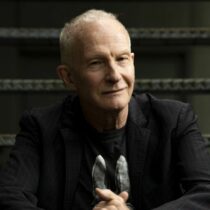Christ Church Cathedral, Vancouver
DanteNova: Music from Dante’s Commedia
Works by: Machaut, Landini, Ciconia, & more
Artists: La Fonte Musica directed by Michele Pesenti with Bill Richardson, narration
From the wailing cries and silences of Inferno to the angelic concerts of Paradiso, this programme revisits the pages of Dante’s Divine Comedy where music resounds throughout. Dante wrote his Comedy around the time when a new musical style, the Ars Nova (“New Art”) spread throughout France and Italy.
La Fonte Musica, an ensemble whose artistic journey is to unveil the roots of the music composed during the transition from the Middle Ages to Renaissance humanism, takes listeners on a musical journey through the Ars Nova and Dante’s timeless masterpiece, to Heaven from Hell.
A pre-concert lecture by Michele Pasotti will take place at 6:15 in collaboration with the Dante Alighieri Society of BC.
Generously supported by Dorothy Jantzen.

Michele Pasotti, director
Since his beginnings with the electric guitar, Michele Pasotti plays and listens to very different musical genres.
He graduated in Lute with highest honours, studying with Massimo Lonardi, and specialized attending masterclasses by Hopkinson Smith and Paul O’Dette. At the Civica Scuola di Musica in Milan he later specialized in Renaissance music Theory and Counterpoint and deepened the study of late medieval practice both in Milan and Barcelona (Esmuc). At Rome’s University “Tor Vergata” he attended the specialization course Ars Nova in Europa, getting a first class degree.
He also received a first class degree in Theoretical Philosophy with a dissertation on Martin Heidegger.
From 2013 to 2018 Michele Pasotti held an Ars Nova course at the Civica Scuola di Musica di Milano. He is professor of Lute at the Conservatorio di Musica “B.Maderna” in Cesena He also gives lectures, either on musicological subjects, or to introduce and spread the knowledge of lutes and early music, also with Radio Broadcasts (Rai Radio 3).
He is founder and director of la fonte musica, the center of his musical life.
Beyond the activity with la fonte musica, he is called to conduct other ensembles like Capella Cracoviensis e Harmonia Cordis.
He plays regularly with Il Giardino Armonico, I Barocchisti, Les Musiciens du Louvre, Balthasar-Neumann Ensemble, Collegium Vocale, Arcangelo, Les Musiciens du Prince, Akademie für Alte Musik Berlin, Il Ricercar Continuo, Coro e Orchestra Ghislieri, Sheridan Ensemble, Cecilia Bartoli.
He loves playing chamber music with Alena Dantcheva, and his trio Il Ricercar Continuo with Giulia Genini e Alessandro Palmeri.
He was guested by the most eminent musical seasons and concert halls in Europe, United States and Asia and was directed by Claudio Abbado, John Eliot Gardiner, Giovanni Antonini, Philippe Herreweghe, Thomas Hengelbrock, Diego Fasolis, Christophe Rousset, Andrea Marcon, Monica Huggett, Nathalie Stutzmann, Barthold Kujiken.
As a soloist (lutes, theorbo, baroque guitar) he has a repertoire that spans from the Middle Ages to the late Eighteenth century. He recorded a cd devoted to the great 17th century guitarist Francesco Corbetta (Dynamic).
He played in more than 70 recordings (beyond those for Deutsche Grammophon, Decca, EMI/Virgin Classics, Naïve, Warner, Sony/Deutsche Harmonia Mundi, SWR, Glossa, ORF, Ricercar, Avie, The Classic Voice, Amadeus) and took part in several live broadcasts (BBC, ORF, WDR, Radio Polskie, Rai Radio 3, Rete 2 of Rsi, France 2, France Musique, Mezzo).

La Fonte Musica
La fonte musica is an early music ensemble on period instruments, founded and led by Michele Pasotti.
La fonte musica was founded to interpret the astonishing musical season which goes from the end of the middle ages to the beginning of the humanism, with a particular focus on Italian Trecento. Our repertoire and research stretches until the end of Renaissance.
A constant and serious philological research is at the origin of every project together with a careful deciphering of rhetoric and grammar in order to understand and translate the creativity, refinement and beauty of ancient music with an experimental attitude for us today.
The ensemble has performed in the most prestigious early music festivals around Europe: Oude Muziek (Utrecht), Resonanzen (Konzerthaus, Vienna), MA Festival Bruges, Ravenna Festival, Innsbrucker Festwochen der Alten Musik, Laus Polyphoniae Antwerpen, Regensburg Tage Alte Musik, Wratislavia Cantans (Wroclaw), Herne Tage Alter Musik, Concerts Medieval du Musée de Cluny (Paris), Urbino Musica Antica, Festival Voix et Route Romane, Festival de Lanvellec, Musica Sacra Maastricht, Konzertsaal der Wiener Sängerknaben (Vienna), Festival Trigonale (Klagenfurt), Festival Povoa de Varzim, Festival Bachowski (Swidniça), Teatro la Fenice (Venise), Festival MiTo (Milan-Turin), Venetian Center for Baroque Music (Venise), Vespri in San Maurizio (Milan), Brighton Early Music Festival.
Enigma Fortuna, our 4 cds box containing the first recording of the complete work by Antonio Zacara da Teramo will be released at Alpha Classics in April 2021.
La fonte musica concerts and cd have been broadcasted by BBC (United Kingdom), Rai Radio Tre (Italy), ORF 1 (Austria), WDR (Germany), RBB kulturradio (Germany), Polskie Radio (Poland), NPO Radio 4 (Netherlands), Antena 2 (Portugal).
La fonte musica last cd “Metamorfosi Trecento”, released by the french label Alpha won the DIAPASON d’OR and Disco del Mese (Amadeus). DIAPASON elected “Metamorfosi Trecento” among The 100 records that all music lovers need to know.
“Metamorfosi Trecento” was also a finalist the best cd of the year (Early Music) at the International Classical Music Award (ICMA).
The first recording project “Le Ray au Soleyl. Musica alla corte pavese dei Visconti (1360-1410)” received the “Supersonic Award” by Pizzicato. DIAPASON rated the cd with 5 diapasons and reviewed it as an “impressive first disc”. It was also Disco del Mese and finalist for Disco dell’Anno on Amadeus.

Bill Richardson, narrator
Bill Richardson lives in Vancouver. His most recent books for children are Last Week, illustrated by Emilie Leduc, and Lola Flies Alone, illustrated by Bill Pechet.


